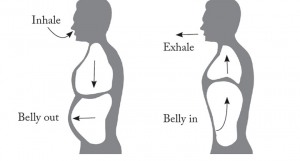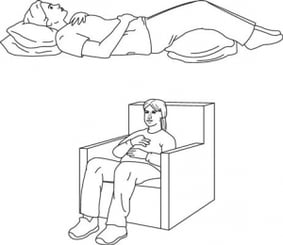Deep breathing is one of the best ways to lower stress in the body.
This is because when you breathe deeply, it sends a message to your brain to calm down and relax. The brain then sends this message to your body. Breathing exercises are a good way to relax, reduce tension, and relieve stress.
Have you ever noticed how you breathe when you feel relaxed? The next time you are relaxed, take a moment to notice how your body feels. Or think about how you breathe when you first wake up in the morning or just before you fall asleep. When your body is stressed you tend to have increased heart rate, fast breathing, and high blood pressure, all decrease as you breathe deeply to relax.
- The way you breathe affects your whole body. Breathing exercises are a good way to relax, reduce tension, and relieve stress.
- Breathing exercises are easy to learn. You can do them whenever you want, and you don't need any special tools or equipment to do them.
- You can do different exercises to see which work best for you.
How do breathing exercises work?
There are different types of breathing exercises which helps with managing stress.
Belly Breathing

Belly breathing is one of the way to do breathing exercise and it is very relaxing. Try this basic exercise anytime you need to relax or relieve stress.
- Sit or lie flat in a comfortable position.
- Put one hand on your belly just below your ribs and the other hand on your chest.
- Take a deep breath in through your nose, and let your belly push your hand out. Your chest should not move.
- Breathe out through pursed lips as if you were whistling. Feel the hand on your belly go in, and use it to push all the air out.
- Do this breathing 3 to 10 times. Take your time with each breath.
- Notice how you feel at the end of the exercise
Mindful Diaphragmatic Breathing

Get into a comfortable position, close your eyes, and start to notice your breath. Before you begin to alter it, pay attention to the pace and depth. Are you taking deep breaths or shallow ones? Are you breathing quickly or slowly? (Becoming aware of your breathing can help you to become more mindful of your body's response to stress, and can help you to notice when you need to deliberately relax your breathing.)
Counted Breathing
Counting your breaths can be helpful, both for pacing and as a form of meditation. This technique helps with pacing—it enables you to elongate your breath and stretch out your exhales. There are a few ways to do this.
- As you inhale, place your tongue on the roof of your mouth right behind your teeth, then breathe through your nose and slowly count down from five; on the exhale, let the air escape through your mouth and count back up to eight. Then repeat. This helps you to really empty your lungs and relax into each breath.
- A variation of this is known as "4-7-8 breathing," and is recommended by wellness expert Dr. Andrew Weil. With this option, you inhale for a count of four, wait for a count of seven, and exhale for a count of eight. This allows you to pause between breaths and really slow things down.
Visualisation Breathing: Inflating the Balloon
Get into a comfortable position, close your eyes, and begin breathing in through your nose and out through your mouth. As you inhale, imagine that your abdomen is inflating with air like a balloon. As you exhale, imagine that the air is escaping the balloon slowly. Remember, you do not have to force the air out; it simply escapes on its own, in its own time. You may want to imagine the balloon as your favourite colour, or that you are floating higher in the sky with each breath if this is relaxing for you. Regardless, the "inflating balloon" visualisation can help you to breathe deeply from your diaphragm rather than engaging in shallow breathing that can come from stress.
There are number of breathing exercises that you can do to help with your stress but these exercises are said to be the most effective exercises. Experiment and see which work best for you!
This article was kindly written and contributed by Ashlie Lopez
Interested in Discovering More About Mental Health?
Find out more at the upcoming 2020 International Mental Health Conference, held from 29-31 July at RACV Royal Pines Resort, Gold Coast.
Download the program here.